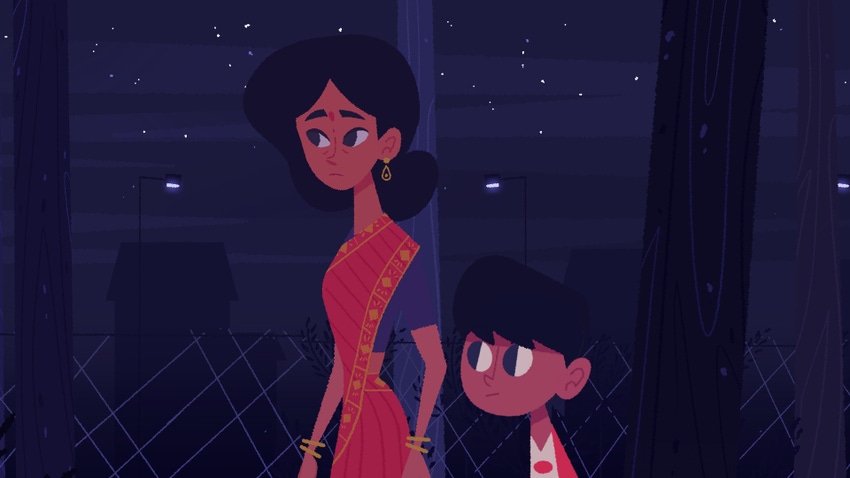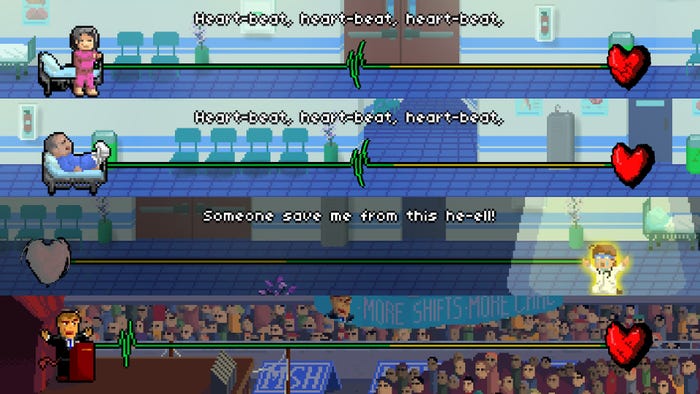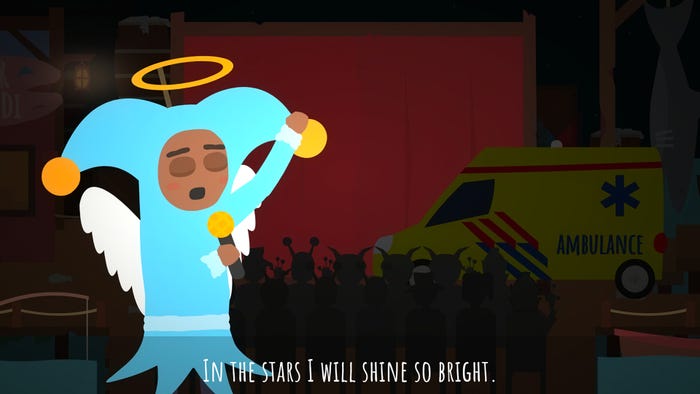
Read More from GDC 2024 | Keep up with the latest game industry event coverage from GDC 2024, including news, talks, interviews, and more from the Game Developer team.
IGF 2024 Winners on creating Venba, Rhythm Doctor, and more
Delivering design insights, inspirations, and challenges from this year's IGF winning teams.

The Independent Game Festival (IGF) recognizes indie designers each year, showcasing some of the best work in the space—culminating in the IGF awards at GDC each year. Game Developer runs a series of interviews called the road to IGF with most of the nominees, looking at what goes into their creation. Now that we know the winners of the 2024 showcase, we’ve compiled a few of their thoughts on their prized creations, from design insights to unlikely sources of inspiration to the importance of telling their stories how they like.
How Venba uses food to explore connections and disconnections with culture for immigrants
Seamus McNally grand prize winning Venba is a game about cooking and connecting to one’s culture. Designer Abhi remembered the moment they came up with the idea for the game: "I remember it very vividly! It came from observing my mother fussing over food and had me thinking about the role food plays in South Asian cultures. Especially in immigrant families, I find food becomes the bridge between first generation immigrants and their assimilated children. I thought it would be interesting to explore this story through the lens of food."
You can read the full interview here.
How dungeon crawler Cryptmaster responds to anything you type into its word-based systems
The creepy Cryptmaster took home excellence in design honors at the IGF awards, thanks in part to its innovative take on typing and words-as-player-verbs.
"The idea of using words came first and then the dungeon-crawling framework came later," said writer and co-designer Lee Williams. "We wanted to have pure keyboard controls, so that kind of grid movement made the most sense."
Once we'd settled on using words for everything, the ideas for mechanics just kept coming. We have variants on hangman, twenty questions, anagrams, riddles, etc. The health of players and enemies is represented by the letters in their names and the letters from collected ingredients are used to literally spell out potion recipes. There are just so many fun things to do with words and letters. I'd say we ditched far more ideas than we used!"
RAM: Random Access Mayhem's body-swapping mechanic was born from playing roguelikes
Audience award-winner Ram: Random Access Mayhem was born of an admitted "skill issue" with challenging examples of its genre.
"RAM: Random Access Mayhem is born of a skill issue." said co-director and producer Toby Murray. "I was really terrible at bullet hell games like Nuclear Throne and Enter the Gungeon and one day wondered to myself "What if I could swap to become the enemies so that I could avoid the bullets they were shooting at me?" I mentioned the idea to Andrew and we decided to use it as the foundation for our Ludum Dare game jam. The idea was well received and so we decided to continue with the project. This morphed into RAM: Random Access Mayhem."
Using medical stories and heart conditions to create musical challenges in Rhythm Doctor

Via 7th Beat Games
Excellence in Audio award-winner Rhythm Doctor combines a narrative about healthcare workers and patients and an innovative take on music theory. Lead designer and composer Hafiz Azman noted the personal inspirations that went into creating this perhaps unlikely combo in our interview:
"For most of my life, I wanted to be a doctor. I took the related subjects in school, shadowed doctors in hospitals throughout their day during my holidays. Through shadowing doctors, I could listen to their difficult conversations with patients and stay in the OT while they performed surgery. Some doctors I shadowed were kind while others were fierce and nasty to their nurses."
"At the last minute before university I switched to doing an Engineering degree, but I still kept a lot of those experiences with me. So, it was because of all of this that when I had a prototype for Rhythm Doctor with just squares, what came to my mind first was that the rhythm could be patient heartbeats. Winston’s (our artist who I started the game with) father is a doctor so he knew some things second-hand, and we both had close friends who studied medicine, so throughout development we could always talk to them and find out how their doctor training was like. It was nice to be able to convey some of our doctor friends’ stories through the game."
Read the whole interview here.
Hand crafting a dystopian world out of cardboard in Phonopolis
Phonopolis won this year’s excellence in visual art award, based on its unique, tactile cardboard-inspired style and implementation. Artist Eva Marková spoke about the design of the core city in the game and how its visuals tell so much of the story: "The city is kind of like a tiered cake. It has three different districts—the Workers’ Quarter, Bureaucratic Quarter and Avantgarde Quarter. We let ourselves get inspired by avant-garde, interwar art movements such as constructivism or futurism, which, unfortunately, also served totalitarian regimes. Efforts to bring the art to the masses and influence them through it often ended not too ideally. The totalitarian atmosphere is emphasized by a limited color palette and use of the color red, commonly associated with communism. At the same time, we wanted to incorporate humor and the absurdity of socialism (that we have our own memories of from having grown up in former Czechoslovakia)."
Exploring broken identities with a steamy post-pandemic vacation in Mediterranea Inferno
Creator Lorenzo Redaelli was inspired to create excellence in narrative winning Mediterranea Inferno to wrestle with stereotypes and cultural myths in modern Italy:
"I knew I wanted to write something about today's Italy. My grandfather was born and raised in the Puglia region where I spent all my summer holidays with my family since I was little. But every year everything was getting worse, older, and more boring."
"I started by considering the most common and widely accepted stereotype about Italy, which is the Italian summer. This stereotype has become a narrative genre that has been explored through various media forms by both Italians and foreigners. However, as a stereotype, it oversimplifies the complexity of the Italian experience and serves as a precedent or common starting point."
Capturing the spontaneity and creativity of improvisational theater with Once Upon a Jester

Image via Crunching Koalas
Best student game winner Once Upon a Jester lets players get very silly with improvisational theater techniques, and creators Mark Lohmann and Kyon Edelenbosch noted a particularly joyful and chaotic methodology for deciding what to put into the game: "Just like how we come up with new game ideas, we just hang out a lot of the time and talk about the game (because we can get kind of obsessed with stuff we work on) and often we just start joking. If we both think it’s funny, we just quickly put it in the game and try not to overthink it. A lot of the later part of the game was thought of in the car while we were on a road trip through Europe. I remember us saying a lot of the time ‘that’s hilarious, but we really can’t put that in the game,’ and I think almost all those ideas went in the game anyway.
"About the ideas that didn’t make the game: we had a whole show in the game where you would perform with a ventriloquist puppet called ‘Comedy Joe’ (he had his own theme song and everything). But something about that show didn’t quite click, so we scrapped it. Another idea that was outside of the theater shows was one where Sok would get abducted by a UFO, and then a whole synth musical song with the aliens would start. We had to scrap it because there was simply no time anymore…Maybe one day we’ll finally get to make that UFO scene…sigh"
How General Hospital and Junji Ito lead to the hilarious horrors of Anthology of the Killer
The Nuovo award-winning Anthology of the Killer offers a mash-up of horror and comedy that its serialized format reportedly encouraged.
"I was interested in trying to make narrative games and especially a serial narrative, since I always admired the strange places those can end up in—like the way the General Hospital soap operas eventually involved aliens and a weather machine, or all those "two gamers on a couch!" webcomics where you check back after 200 installments and now it also involves aliens and a weather machine. In general, I like the idea of doing something over and over until the edges blur and it becomes gradually more strange," said creator Stephen Gillmurphy (aka thecatamites aka garmentdistrict).
"At some point I read the English translation of Junji Ito's Uzumaki for the first time and got really excited by it. It was a serial horror narrative where the individual chapters kind of split between Nancy Drew-ish mystery storytelling and startling surrealist imagery that seemed to belong to a completely different narrative order. So it made me feel like you could do anything you wanted with "horror." Also, people sometimes say horror stories need a disposable protagonist to work, but to me, it actually heightened the effect to have these images presented in a monster-of-the-week way with a recurring heroine pulled into one situation after another."
"The Haunted PS1 stuff also kicked off while I was becoming more interested in horror, which I felt excited by. It felt like "art games" had gotten a bit glossy and professionalized these last few years and so I was glad to see people picking up the scrappier end of those techniques and using them for inventive Roger Corman-y exploitation purposes. It was nice to feel like I was working on the margins of a different scene."
Game Developer and GDC are sibling organizations under Informa Tech.
About the Author(s)
You May Also Like









